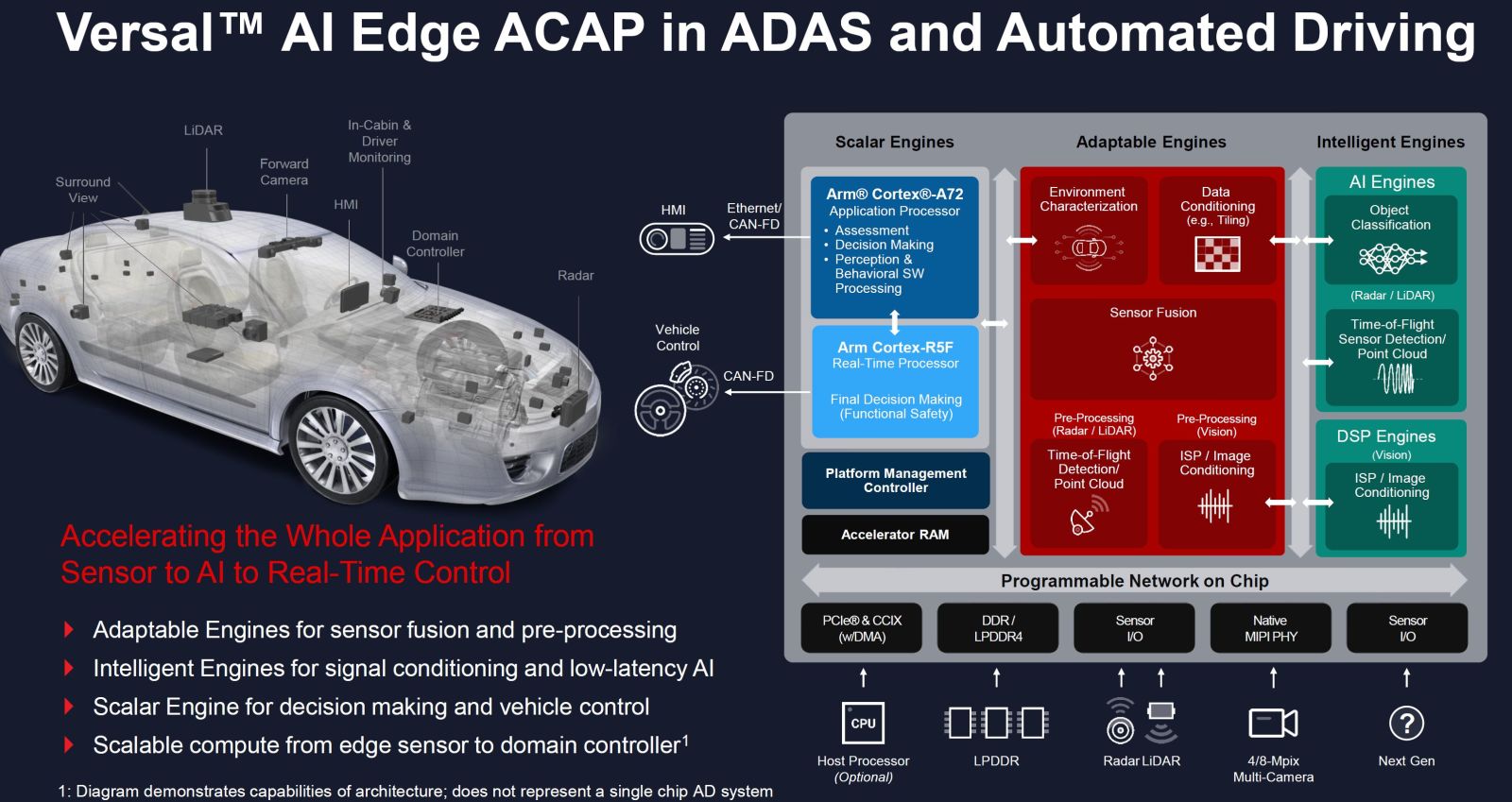Xilinx announces Versal AI Edge ACAP
Intelligent vision, medical, automotive beats Nvidia
Xilinx enjoys Versal ACAP’s numerous line of adaptive computing acceleration platforms, and the addition of an adaptive product certainly boosts the leaderboard and adds some competition issues, including Nvidia.
The new generation of Versal AI Edge ACAP offers 4X AI wattage and 10 times higher calculation density compared to the adaptive SoC from the previous generation. This also makes the Versal AI Edge series the most scalable and adaptable portfolio in the world for the next generation of distributed intelligent systems.
Versal AI Edge Adaptive Computing Accelerators (ACAP) provide intelligence for a wide range of applications, including automated driving with the highest levels of functional safety, collaborative robotics, predictable factory and healthcare systems, and payloads for many aerospace and mission missions markets.
The portfolio includes AI Engine-ML to deliver 4X computing for machine learning compared to the previous AI Engine architecture and integrates new accelerator RAM with an improved memory hierarchy for evolving AI algorithms. These architectural innovations provide up to 4X AI wattage per GPU and lower latency, resulting in far more capable edge devices.
4X watts of performance compared to GPUs
Xilinx took the time to look at three scenarios that customers used intelligent vision and AI imaging to show us some numbers. Xilinx wanted to stimulate a smart image sensor and used the popular ResNet50 224×224 library. The Versal AI Edge VE2102 offers a performance of 1. To see also : Collins Aerospace Marks ARC-210 Airborne Satcom Radio’s Delivery Milestone.9X per watt above the Jetson Xavier NX. Nvidia numbers are used from publicly available data, and readings are derived from images / second / watt.
The second demonstration, designed to mimic a stand-alone system or edge aggregation, the Versal AI Edge (VE2302) offers 3.3X watts of performance against the Jetson AGX Xavier in 15W mod. In the processor accelerator, the difference jumps to 4.2X watts of performance for the Versal AI Edge (VE2802) compared to the Jetson AGX Xavier (MAX N-Mode), representing the most efficient configuration of the device in their respective wallets.
Automated systems with activated AI require high computing density, which can accelerate entire applications from sensor to AI to real-time control. Versal AI Edge devices achieve this by providing 10X computing density compared to Zynq UltraScale + ™ MPSoC, allowing smarter autonomous systems.
In addition, Versal AI Edge devices support multiple safety standards in the industrial (IEC 61508), avionics (DO-254/178) and automotive (ISO 26262) markets, where suppliers can meet ASIL C arbitrary hardware integrity and ASIL D system levels. of integrity.
“Applied computing applications require an architecture that can be developed to meet new requirements and scenarios with a combination of flexible computational processing within stringent thermal and latent constraints,” said Sumit Shah, Senior Director, Product Management and Marketing in Xilinx. “The Versal AI Edge series provides these key attributes for a wide range of applications requiring greater intelligence, making it a critical addition to Versal’s portfolio of devices that scale from intelligent end-to-end sensors to processors.
“Edge market opportunities are growing exponentially, and the AI chipsets that serve these unique applications are expected to double by 2021 to 2025,” said Dan Mandel, senior analyst, IoT and embedded technology at VDC Research. “By creating an AI-specific design that focuses on accelerating productivity while remaining scalable and low-power, Xilinx’s Versal AI Edge series is a compelling solution to tackle these critical markets.”
Versailles AI Edge 7nm
The Versal AI Edge series uses the proven 7-nanometer Versal architecture and miniaturizes it for low-latency AI calculations, all with energy efficiency up to six watts and safety and security measures required in end applications. To see also : Autonomous Software-Defined Radio Receiver Market Size, Key Company Profiles, Types, Applications and Forecast To 2027 – Cabell Standard.
As a heterogeneous platform with a variety of processors, the Versal AI Edge series combines the engine with the algorithm, with scalar motors for embedded computing, adaptive motors for sensor synthesis and hardware adaptation, and intelligent motors for AI output that scales up to 479 (INT4E)[2]– Unsurpassed by ASSP and GPUs aimed at end applications – and for advanced workloads for processing signals for vision, radar, LiDAR and software-defined radio.

The connection units range from LPDDR-4266, 32Gb / s transceivers to meet all required protocols in end applications, 40G multirate Ethernet, PCIe® Gen4 with CCIX and built-in MIPI support for visual sensors with a resolution of up to eight megapixels and beyond – critical for ADAS Level-2 and higher. With more powerful AI engines and an improved memory hierarchy that includes accelerator RAM, the Versal AI Edge series is ideal for a wider range of applications in many markets.
Available for both hardware and software developers, the Versal AI Edge ACAP offers a design entry point for any developer, including Vivado® design tools for hardware developers, a unified Vitis software platform for software developers, Vitis AI for data and domain researchers – specific operating systems, frameworks and acceleration libraries for the platform’s target applications.
The Versal AI Edge series is the newest member of Versal ACAP’s portfolio, adaptive SoCs that are fully software programmable, with performance and flexibility far exceeding that of conventional CPUs, GPUs and FPGAs. ACAPs can be modified at both hardware and software levels to dynamically adapt to the needs of a wide range of applications and end-to-cloud workloads. Versal AI Core and Versal Prime versions are in full production, with Versal Premium ACAPs already taking samples.
Availability
Versal AI Edge serial design and maintenance documentation is available to customers with early access, with shipments expected in the first half of 2022 and will include a roadmap for automotive and defense devices.




Comments are closed.